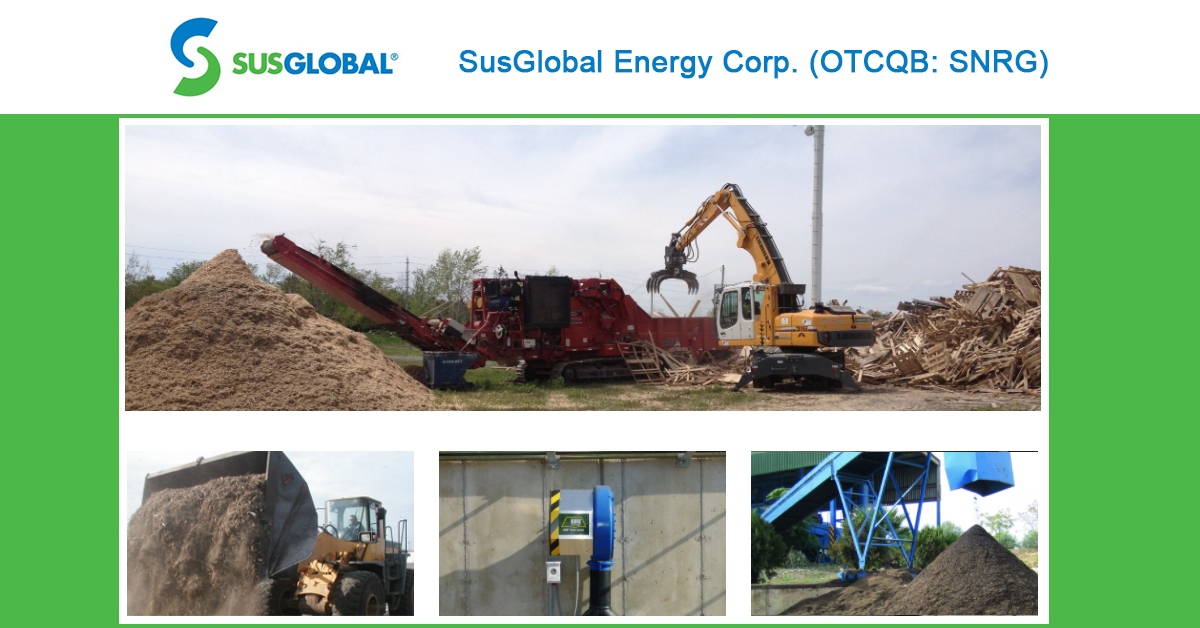SusGlobal Energy Corp. (OTCQB: SNRG) is a renewables company building a portfolio of proprietary waste-to-energy technologies and regenerative products. Company Chairman and President, Marc Hazout gives his insight into how SusGlobal is driving change in the regenerative economy and solving global challenges that affect us all.
The Problem
The amount of organic waste we as a society produce reaches into the millions of tons, and most of this waste heads straight to landfills. This is no longer a sustainable solution, given the value of the land and the rate at which landfills are filling up. Municipalities around the world lack proper infrastructure to divert the waste, save for a handful of transfer sites, such as those provided by SusGlobal.
If municipalities continue with their current systems, it won’t be long before the contribution to greenhouse gases becomes unacceptable. By building transfer sites adjacent to treatment plants, the municipalities can divert the waste without the hassle.
The Solution
SusGlobal offers a full range of services to help municipalities properly handle their organic waste. The base of these services is a regenerative approach to an older technology called anerobic digestion.
SusGlobal receives source-separated organic streams from a municipality and then processes the waste into an organic slurry that can be piped or trucked to an anaerobic digester.
Anaerobic digestion breaks down the material and reduces the emission of landfill gas into the atmosphere. It is also a widely used source of renewable energy. The digestion process produces a biogas that can fuel combined heat and power gas engines or be upgraded to natural gas-quality biomethane.
Additionally, the remaining digestate can be treated with a proprietary heating process and enzymes, and then transformed into a liquid, pathogen-free fertilizer. SusGlobal also makes organic compost from this process, and both the compost and fertilizer have proved successful in the agriculture industry.
The Growth of Regenerative Economy
As the name suggests, the regenerative economy shuns the ‘use and discard’ model. Instead, the primary focus is to use, reuse and reproduce as often as possible. SusGlobal is determined to be at the forefront of this efficient approach to waste. Rather than waiting until there’s no alternative, the company is developing solutions that will pave the way for sustainability for decades to come. As the population grows, it’s clear that services like those offered by SusGlobal will be needed all over the world.
Four Revenue Streams
Increased demand potentially means increased revenues for service providers. As it currently stands, SusGlobal’s technologies and business model provide the company four distinct revenue streams:
- Tipping fee: SusGlobal charges municipalities a fee to divert waste.
- Biogas: SusGlobal sells electricity to the grid based on the energy produced.
- Products: SusGlobal supplies the agriculture industry with fertilizer and compost.
- Credits: SusGlobal receives carbon credits after municipalities are audited to show a reduction in waste.
A New Approach to Old Technology
Marc Hazout, was first introduced to the potential of digester technology by a chemical engineer. Hazout realized that SusGlobal could improve the inefficiencies of anaerobic digesters and help water treatment plants reach their full regenerative potential. While the digester technology may not be new, SusGlobal’s regenerative approach could help municipalities get more from their existing equipment. This is the reason SusGlobal has the potential to become a global disruptor in a rapidly pivoting economy.
Major Milestones
SusGlobal has already proven its technology in Canada, and the company is attracting plenty of attention from a variety of municipalities. It’s now cash-flow positive, providing the company solid footing as it prepares to launch its first operation in the United States. SusGlobal’s profit margins are solid and boosted by the reliable payments of government contracts.
As 2019 continues, SusGlobal plans to be at full expansion for its first project. This means working closely with treatment plants to divert the waste, and with utility companies to produce the biogas and sell the electricity. SusGlobal will also create the liquid fertilizer that has been in high demand.
Based on current projections, the global liquid fertilizer industry is expected to reach nearly $2 billion by 2023. As the popularity of organic farming rises, SusGlobal will be able to meet market needs by producing 1,000 liters of liquid fertilizer for every one ton of organic waste.
Looking Ahead
One of SusGlobal’s short-term goals is to uplist from the OTC to a higher exchange. As the company continues to grow in terms of revenues and new projects throughout North America, its chances of achieving this goal appear closer by the day.
About the Author
Stuart Smith is the CEO and Founder of SmallCapVoice.com. SmallCapVoice.com. is a recognized corporate investor relations firm, with clients nationwide, known for its ability to help emerging growth companies build a following among retail and institutional investors. SmallCapVoice.com utilizes its stock newsletter to feature its daily stock picks, audio interviews, as well as its clients’ financial news releases. SmallCapVoice.com also offers individual investors all the tools they need to make informed decisions about the stocks they are interested in. Tools like stock charts, stock alerts, and Company Information Sheets can assist with investing in stocks that are traded on the OTC BB and Pink Sheets. To learn more about SmallCapVoice.com and their services, please visit https://www.smallcapvoice.com/the-small-cap-daily-small-cap-newsletter/


